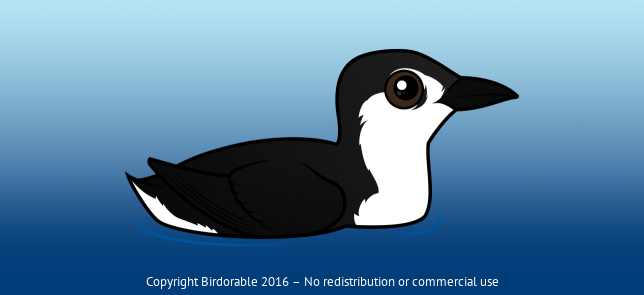Guadalupe Murrelet
About the Guadalupe Murrelet
Also known as: Xantus's Murrelet


The Guadalupe Murrelet is a relatively newly recognized species of auk found in the Pacific Ocean off California and Mexico. The species was split from the Xantus's Murrelet, along with the Scripp's Murrelet, in 2012.
Guadalupe Murrelets feed far out in the ocean outside of breeding season. They are often found around larger pelagic fish species. As is typical with auk species, the Guadalupe Murrelet feeds by diving under the water, propelling itself with its wings.
Baby Guadalupe Murrelets are highly precocial. This means that they are able to care for themselves at a very early age. The chicks leave the nest after just two days, joining their parents at sea.

Find cute products & gifts with our Birdorable Guadalupe Murrelet
Details & Statistics
Added to Birdorable
Hatched January 31, 2016
Scientific Name
Synthliboramphus hypoleucus
Bird Family
Measurements
Length:
9 to 9.8 inches
(22.9 to 24.9 cm)
Wingspan:
15.7 inches
(39.9 cm)
Weight:
4.6 to 6.5 ounces
(130.4 to 184.3 grams)
International Names

Chinese
白腹海雀

Czech
alkoun kalifornský

Danish
Brun Dværgalk

Dutch
Xantus' Alk

Finnish
kalifornianmurri

French
Guillemot de Xantus

German
Lummenalk

Italian
Urietta di Xantus

Japanese
セグロウミスズメ [seguroumisuzume]

Norwegian
Kaliforniastarik

Polish
morzyk piskliwy

Portuguese
Mérgulo-de-asas-claras

Russian
Пыжик ксантуса

Spanish
Mérgulo de la Guadalupe

Swedish
guadalupealka

















